- Startseite
- Publikationen
- GIGA Focus
- Claimed Legitimacy: Appreciating the Diversity of Regional Organisations
GIGA Focus Global
Vielfalt zählt: Wie Regionalorganisationen ihre Legitimität bewerben
Nummer 4 | 2021 | ISSN: 1862-3581

Regionalorganisationen (ROs) sind zentrale Akteure des globalen und regionalen Regierens und ihre Autorität hat in allen Weltregionen zugenommen. Deshalb sind diese ROs zunehmend umstritten und politisiert, was den Druck erhöht, ihren Herrschaftsanspruch zu rechtfertigen. Im Zuge dieser Legitimation führen ROs verschiedene Normen an, denen sie sich verschreiben.
Unsere neu erhobenen Daten zeigen, dass RO-Legitimation diverser wird. Dies ist zu großen Teilen eine Folge der zunehmenden Bedeutung von liberalen und kommunitaristischen Normen, wie zum Beispiel Demokratie, Menschenrechte und eine gemeinsame Identität, die mittlerweile mehr als die Hälfte aller Statements ausmachen. Doch diese globalen Trends beeinflussen nicht alle ROs gleichermaßen. Wir beobachten zudem regionsspezifische Trends und Muster in der Diversifizierung.
Diese Legitimationsmuster spiegeln die normativen Fundamente der Regionen und die beworbenen Identitäten der ROs wider. Dies ist aufschlussreich im Hinblick auf die Relevanz von regionsspezifischen Herausforderungen und Charakteristika wie Kultur und Geografie. Regionen im Globalen Süden verdienen besondere Aufmerksamkeit, da ihre Eigenheiten noch immer zu häufig außer Acht gelassen werden.
Die Gründe für die zunehmende normative Diversifizierung liegen in der steigenden Vielfalt an Stakeholdern und Zielgruppen, Sozialisierungs- und Diffusionsprozessen sowie dem Entstehen von regionsspezifischen Themen von besonderer Relevanz. ROs agieren deshalb heutzutage in einem komplexeren sowie anspruchsvolleren Umfeld.
Fazit
Eine genauere Betrachtung der Legitimitätsaussagen von ROs ist sinnvoll, um die normativen Entwicklungen innerhalb einzelner Regionen sowie auf globaler Ebene nachzuvollziehen. Ein stärkeres Bewusstsein für regionale, normative Fundamente und deren Wandel erhöht die Chance auf eine nachhaltige Kooperation, die auf gemeinsamen Werten und Prioritäten fußt und allen Parteien gleichermaßen zugutekommt.
ROs Require Legitimacy and Therefore Engage in Legitimation
Regional integration is frequently associated with the European Union (EU). Indeed, other ROs are often measured against the standard of the EU model as the trailblazer for regional integration (Lenz and Burilkov 2017). It is important to understand, however, that regional integration is a process that has shaped all major world regions and that ROs across the globe have become key actors in global and regional governance. Whereas the EU is certainly the most visible, ROs such as the African Union (AU), the Association of Southeast Asian Nations (ASEAN) and the Organization of American States (OAS) have evolved into key regional actors with growing influence and visibility. This is part of “a marked, though uneven increase in the authority of international organizations” that envelopes all world regions (Hooghe, Lenz, and Marks 2019: 38). This trend is often accompanied by heightened expectations, and ROs have recently been confronted with growing contestation and politicization. This, in turn, increases the pressure on them to justify their right to rule. We refer to such justifications as discursive legitimation.
By this, we mean that IOs justify their right to rule in the public domain with reference to standards of appropriate behaviour, or norms, that they claim to embody or pursue. Driven by RO representatives, legitimation seeks to stabilise or enhance the belief in an RO’s legitimacy among the relevant audience. Legitimacy is important for ROs because it enhances the chance that their rules will be complied with in the absence of vigorous enforcement mechanisms and that they can count on member states’ and other constituencies’ financial and political support. This renders constant legitimation vital for ROs (Dingwerth et al. 2019). We suggest that region-specific changes as well as the political contestation of ROs, augmented by an increasingly diverse set of stakeholders, has diversified how ROs claim legitimacy.
The empirical findings are based on a novel dataset on the legitimacy claims of ROs. In the LegRO project, we systematically collected and coded two types of documents from 28 ROs over four decades (1980–2019) across all world regions: annual reports issued by the RO's general secretariats and communiqués published by the heads of state or government at the end of RO summits. Based on previous research on legitimation and organisational communication as well as initial empirical insights, we have identified 13 normative themes falling into four normative domains (see Table 1) to which a legitimation statement – the foundation of our coding approach – can refer. Legitimation statements are statements that positively evaluate the RO or express its identity (Lenz et al. 2020). We have identified close to 13,000 legitimation statements in more than 1,200 coded documents.
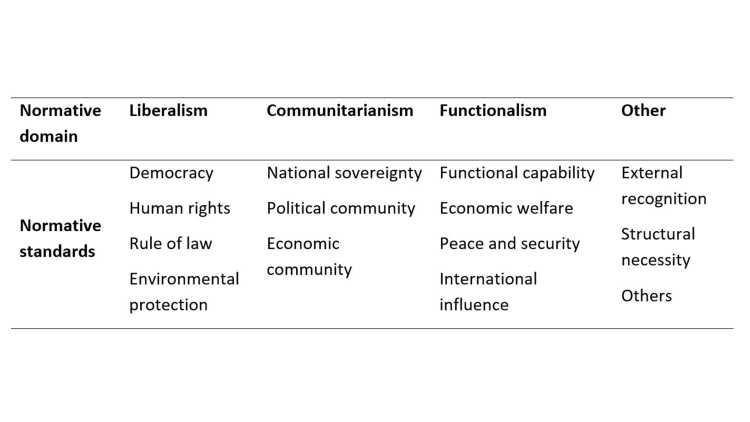
In the following, we provide further insights into this novel data. We first elaborate on the general diversification of discursive legitimation and subsequently present instructive regional patterns. We then outline various explanations for this diversification and conclude with policy implications.
Legitimation Claims Have Become More Diverse
Our novel data on legitimacy claims demonstrates that ROs are increasingly invoking a more diverse set of norms to justify their right to rule, including variation across different organisations. Whereas some ROs remain focused on specific norms, others are incorporating a growing range. We define diversity as the number of different normative themes an RO uses in its legitimation and measure this as the count of normative themes, out of a total of 13, used in the respective documents of an RO in a given year. As Figure 1 demonstrates, ROs have increasingly used a broader and more diverse set of normative standards in their attempts to claim legitimacy. We can see that the use of liberal norms steadily increased from less than 10 per cent of all statements to more than 23 per cent in 2019. Overall, the average number of normative themes an RO references has increased from approximately three in the early 1980s to more than six today. This is in large part due to the growing importance of liberal and communitarian norms, such as democracy, human rights, and a common identity, which today account for more than half of all statements.
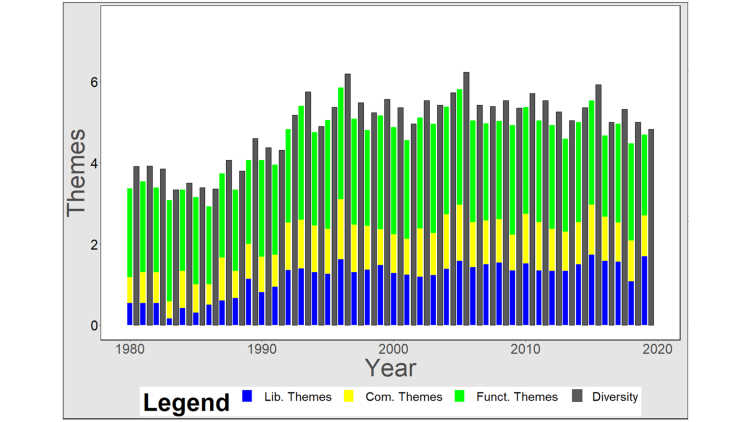
This development suggests that the increasing diversity is at least partially driven by the emergence of new norms which have enteren the “global script” of ROs (Börzel and van Hüllen 2015). Take human rights, for example: In the 1980s, human rights legitimation was present in less than 20 per cent of all RO-years in our sample, driven by only two ROs (CoE and OAS). In the 1990s, this number increased to approximately 33 per cent. Similarly, the share of ROs that have regularly used human rights legitimation over the past decade compared to the 1980s has almost tripled. As part of a “liberal” global script, the spread of human rights as an emergent norm after the alleged victory of liberalism over socialism is therefore striking and has contributed to the observed diversification in ROs’ legitimacy claims.
The trend of normative diversification, however, has not affected all ROs equally. Many ROs have historically focused on economic cooperation and development. Some of these ROs, such as the Economic Community of West African States (ECOWAS) and the Pacific Islands Forum (PIF; formerly the South Pacific Forum (SPF)), have increasingly drawn on a range of norms beyond economic issues. Others, however, have not notably broadened the scope of their legitimation and remain narrowly focused on economic welfare.
For the Organisation of Arab Petroleum Exporting Countries (OAPEC), for instance, liberal and communitarian norms make up less than five per cent of all statements, while references to economic themes greatly dominate in all years. We observe a similar pattern for the European Free Trade Area (EFTA), where the number of legitimacy claims based on economic welfare is more than ten times higher than the number of liberal and communitarian legitimacy claims taken together. Moreover, the focus on global trends in diversification may obscure relevant regional differences. Hence, zooming in on regional patterns and trends produces a more nuanced picture of developments regarding ROs’ claims to legitimacy.
Legitimation Patterns Are Also Region-Specific
Indeed, we observe region-specific trends and patterns in legitimation. We consider four world regions: the Americas, Europe, Africa, and Asia and the Pacific (as one region). Additionally, we consider five ROs to be cross-regional (Asia-Pacific Economic Cooperation (APEC), League of Arab States (LoAS), Commonwealth of Independent States (CIS), and Organization for Security and Co-operation in Europe (OSCE)). Figure 2 shows the region-specific patterns based on the last four decades taken together.
We see, for instance, disproportionate democratic legitimation in the Americas and high-intensity security legitimation in the Asia-Pacific region. In Europe, we observe exceptionally strong human rights legitimation, while legitimation via national sovereignty is practically irrelevant.
Legitimation patterns are reflective of the regions’ normative bases and the identities promoted by the ROs. This is instructive for learning about the relevance of region-specific challenges and characteristics such as culture or geography, as we explain below. Regions in the Global South and their ROs warrant particular attention in this regard, as their distinctive features are still too often neglected in mainstream research. In the following, we present three illustrative region-specific normative legitimation patterns and diversification trends in the Global South, by examining five different ROs.
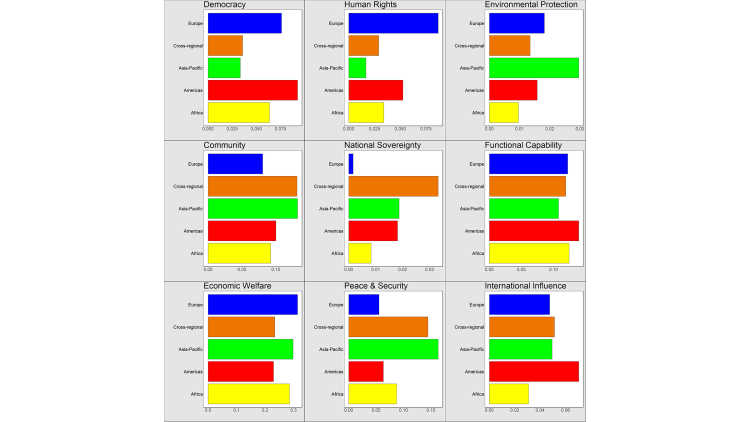
Communitarian Legitimation: The Role of an Arab Identity
To begin with, we find an unusually strong emphasis on community norms in the Arab world. Overall, community norms – that is, norms that emphasise community based on a shared identity, culture, or history as the main guiding principle of society –, matter in all world regions. Every RO in our sample has claimed legitimacy based on these norms. Their role in the Arab world, however, is remarkable and suggests region-specific characteristics. The most prominent RO in the region, the League of Arab States (LoAS), deviates from the overall picture across all 28 ROs because communitarian norms are almost equally important as functional norms in its discourse.
Indeed, as Figure 3 shows, communitarian norms dominate in almost half of all years under observation. Political community represents the most important normative theme, in absolute numbers, for the LoAS over the entire period of observation. This does not come as a surprise. The LoAS comprises 22 Arab states and was founded in a postcolonial nation-building context, which helps explain the strong emphasis on communitarian norms in its legitimation claims. The LoAS has a unique membership criterion – namely, that member states need to be Arab nations. Additionally, its two original objectives, reinforcing the sovereignty of all newly established Arab states and championing the rights to self-determination of the Palestinian people in the Israeli-Palestinian conflict, strongly reflect the relevance of an Arab identity for this RO. Throughout its existence, the LoAS has fostered this Arab identity and reinforced strong cultural ties among its member states (Worrall 2017; Barnett 1998).
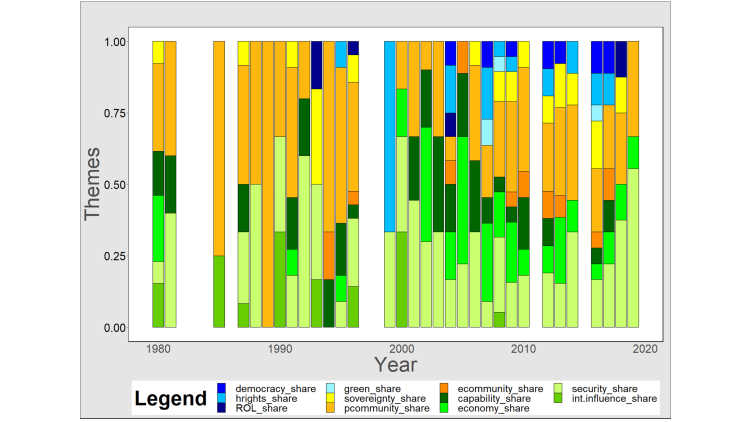
Notions of Pan-Arabism and the “Arab Nation” can thus frequently be found in its legitimacy claims. In the 2017 communiqué from the organisation’s summit in Amman, the LoAS’s heads of state and government committed, for instance, to “empowering it (the Arab League) as an incubator of our unifying Arab identity” (LoAS 2017: 4). Similarly, their current secretary general recently described the organisation as the “House of Arab” (Ahram Online 2018). This example nicely illustrates how cultural features, in this case the strong relevance of an Arab identity, can affect legitimacy claims.
Functional Legitimation: Africa’s Turn to Security
Africa is notorious for the prevalence of conflicts on the continent. Yet African ROs have for the most part been founded as economic integration and development projects or, in the case of the Organization of African Unity (OAU), to achieve continental decolonisation, protect state sovereignty and promote unity. To this day, the most relevant sub-continental ROs are classified as regional economic communities (RECs). In the 1980s and early 1990s, security hardly featured in the discursive legitimation of African ROs. In the mid to late 1990s and early 2000s, however, various security crises and challenges in combination with international neglect during the post-Cold War period prompted some African ROs to venture into the area of peace and security and claim agency. With this development, legitimacy claims based on security norms became central features in the discursive legitimation of some African ROs. Recently, the ECOWAS Authority reaffirmed “its commitment to the promotion of peace, security and stability in the sub region, as a prerequisite for the economic integration and development of the region” (ECOWAS 2019: 6).
While security has not replaced economic welfare as the dominant normative theme, it has been the second most important normative theme for the African Union (AU), the South African Development Community (SADC) and ECOWAS since the turn of the millennium. In fact, the share of security legitimation claims has increased with every decade for each of these ROs (Figure 4). This development indicates that peace and security have become part of the identity of the three arguably most powerful and consequential African ROs, which now derive their legitimacy to a significant degree from their activities in this area or at the very least claim legitimacy on this basis. Hence, African regionalism today cannot be understood without an appreciation of the emphasis that is being placed on regional solutions aimed at the establishment of peace, security, and stability.
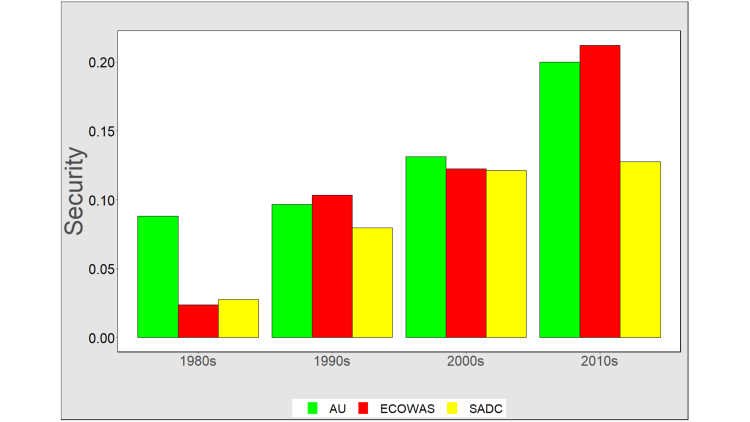
Liberal Legitimation: A “Green” Agenda in the Pacific
Finally, the use of “green” norms has significantly increased in recent years. Indeed, issues of climate change, environmental degradation and pollution – and with them the search for environmentally sustainable solutions – have become key topics of contemporary global governance. In the world of ROs, the emphasis on environmental protection has increased in recent years by more than four times from the period 1980–2010, but nowhere has this increase been greater than in the Pacific Islands Forum (PIF). As Figure 5 shows, this RO does indeed head the ranking for total legitimacy claims based on environmental protection.
Furthermore, the PIF is also the RO which uses the environmental protection norm most consistently in its legitimacy claims going back to the 1980s. This stands in contrast to the second greatest user of this norm, APEC, which has consistently claimed legitimacy based on environmental protection only since 2007. This observation can be traced back to the distinct geographical characteristics of the two regions concerned. The PIF consists of several small and developing island countries in addition to Australia and New Zealand. As such, climate change arguably poses a greater threat to these Pacific countries than it does to any other region. Severe weather phenomena such as hurricanes or tropical cyclones, rising sea levels, and losses in biodiversity are rendering the region significantly less hospitable and diminishing its main sources of income: tourism and fisheries. Hence, the PIF is fully dedicated to fighting climate change and environmental degradation, drawing on its conviction that “[as] Large Ocean Island States, the ocean is our way of life” (PIF 2015: 6).
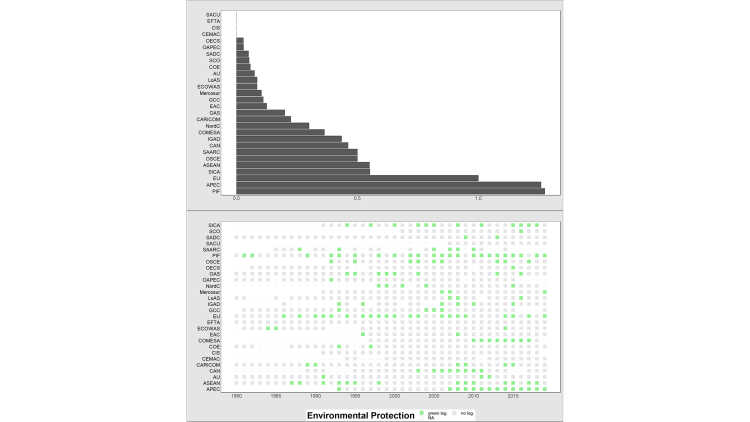
It is striking to note that this focus on environmental protection coincides with the PIF’s ambition to exert international influence. The member states’ climate vulnerability as small and remote island states is caused by the inaction of the international community. Thus, the PIF has also become an active proponent of global measures to combat climate change and its adverse effects. Consequently, region-specific features have affected how the PIF claims legitimacy. It is important to understand that matters related to the environment are part and parcel of the PIF’s work and closely tied to its identity and raison d’être as an RO.
Multiple Factors Shape Diversification
The growing diversification of legitimacy claims is related to the increasing variety of stakeholders and audiences, socialisation and diffusion processes, and the emergence of region-specific issues. As such, ROs today operate in a more complex and demanding environment. The following section briefly discusses these arguments.
Stakeholders and Audiences: ROs are composed of member states. As such, these member states are the ROs’ principals and primary stakeholders. Member states’ expectations should not only shape the formal institutional framework, but also greatly influence an RO’s identity, its policy priorities and, consequently, how it claims legitimacy through communication. Nonetheless, other stakeholders are (increasingly) relevant as well. They include the citizens of member states, who can provide more direct popular legitimacy and have become more concerned with ROs as the latter have become politicised. Indeed, our data shows that people-centred legitimation has increased over the years. In addition, for many ROs, particularly in the Global South, securing external funding is crucial for effectively executing their mandate. This renders donor countries and organisations relevant stakeholders. Moreover, ROs which are active in matters of security rely, for instance, on approval from the United Nations Security Council (UNSC). These ROs frequently also rely on civil society organisations (CSOs), as their compliance and cooperation can directly impact the feasibility and effectiveness of ROs’ implementation efforts. ROs in the economic field, on the other hand, can greatly benefit from the support of the business community. These actors are not only stakeholders but also audiences, that is, the target of legitimation communication. In these roles, each actor brings their own set of expectations, up on which their support is based, to the table. Hence, we would expect a more diverse set of stakeholders and audiences to lead to normatively more diverse legitimation. We would also expect region- or RO-specific compositions of stakeholders and audiences to result in region- or RO-specific patterns of legitimation. In this sense, legitimation reflects a strategic endeavour on the part of legitimating actors to cater to the normative expectations of relevant audiences.
Socialisation and Diffusion: While ROs are often viewed as black boxes and monolithic actors, and much of the focus is on the member states as an RO’s self-interested principals, we must not neglect the agency of bureaucrats in the ROs (cf. Barnett and Finnemore 1999). RO employees are socialised in the organisation’s environment. Hence, over time they internalize the norms and aspirations that the RO stands for and become “guardians of the treaty” (Börzel 2021: 188). It follows that as an RO’s mandate broadens to include new issue areas or normative aspirations, we can expect the normative diversity through which this RO claims legitimacy to increase as well. In addition to internalising existing norms, RO employees also bring their own convictions and values to work. Consequently, RO staff might expand on existing normative bases and foster increased normative diversity in RO’s legitimacy claims. In cases of socialisation, legitimation may be described as genuine, even if the broadening of the mandate happens to be based on strategic considerations. Moreover, so-called diffusion processes can lead to increasing normative diversity. Sommerer and Tallberg argue that “IO decision makers, too, are likely to search for models to copy in their efforts to design policies and institutions that are effective and legitimate” (Sommerer and Tallberg 2019: 400). Here, the corresponding claim is that RO representatives acquire normative diversity in legitimation discourse by observing the legitimation activities of other ROs in their organisational environment. This is because certain institutional forms and ways of claiming legitimacy can come to be widely seen as legitimate once they are used by important reference organisations or the wider organisational environment. This, in turn, exerts pressure on other ROs to adopt such norms strategically, or these norms become internalised by actors and thereby part of an RO’s identity through socialisation.
Region-Specific Issues: Lastly, the emergence of region-specific issues can explain at least some of the normative diversity observed, as well as help account for regional differences in legitimation claims. Many ROs have seen their mandates expand over time in response to new challenges and regional crises. Once added to the mandate, new norms are likely to become part of an RO’s identity and remain relevant in its activities. This, in turn, increases the likelihood that they will feature in the RO’s legitimation claims. As norms are more likely to be added than removed, the normative diversity of ROs’ legitimation discourses increases. Moreover, as challenges and crises are often region-specific, distinctive regional patterns in how ROs claim legitimacy emerge. Some illustrative examples include the ECOWAS’ ‘security turn’ in response to regionally destabilizing internal conflicts in Liberia and Sierra Leone in the 1990s; the PIF’s increasing emphasis on green norms as the impacts of climate change worsened; and the relative decline in the EU’s reference to economic matters after institutional changes in the 1990s expanded its policy scope to address new areas of concern. Here, it becomes imperative to look at regional developments with regards to challenges and crises in order to understand normative diversity and patterns in legitimation.
Implications for International Cooperation and Policymaking
Today, ROs in all world regions have become active and influential players in international cooperation and policymaking. A closer look at ROs’ legitimacy claims helps us identify normative developments and improve our understanding of political challenges and opportunities in specific regions as well as in global governance more broadly. Greater awareness of a region’s original normative foundations and recent shifts increases the chances of mutually beneficial long-term cooperation based on shared values and priorities. Protagonists of international cooperation ought to be aware of these developments in the face of the growing contestation and delegitimation of international political institutions.
More concretely, the EU and Germany, as strong supporters of ROs across the world, can benefit greatly from paying close attention to these communicative patterns and trends as they provide food for thought regarding policymaking. The fact that we can demonstrate an increase in normative diversity and distinctive regional patterns in RO legitimation should lead policymakers to consider the origins of such trends and patterns. The ascribed relevance or emergence of certain stakeholders and audiences reflected in diversified legitimation, for example, can reveal new actors whose interests and inputs should be considered or included in policymaking. Normative beliefs and belief changes within ROs help policymakers identify allies whose visions of the future align with theirs. Region-specific contexts and priorities in multilateral cooperation, which are evident from an RO’s legitimation discourse, underline the importance of regional ownership and agency. Thus, we believe that region-specific and context-sensitive approaches to international cooperation and policymaking are now more important than ever.
In designing regional policies and cooperation strategies, it is important to ensure the support of the relevant ROs. Only in this way can policymakers make certain that today’s problems are sensibly addressed through interregional and interorganisational cooperation with viable and mutually beneficial policies. Such cooperation is needed in an increasingly interdependent world in which crises frequently spread across regions and many challenges defy artificial regional boundaries.
Fußnoten
Literatur
Ahram Online (2018), Arab League Chief Hopes Arab Countries Can Push for Political Solution to Syria Crisis, http://english.ahram.org.eg/NewsContent/2/8/ 297714/World/Region/US-attack-on-Syria-will-lead-to-more-bloodshed,-Ar.aspx (21 June 2021).
Barnett, Michael (1998), Dialogues in Arab Politics: Negotiations in Regional Order, New York, Chichester: Columbia University Press.
Barnett, Michael N., and Martha Finnemore (1999), The Politics, Power, and Pathologies of International Organizations, in: International Organization, 53, 4, 699–732.
Börzel, Tanja A. (2021), Why Noncompliance. The Politics of Law in the European Union, Ithaca, NY: Cornell University Press.
Börzel, Tanja A., and Vera van Hüllen (eds.) (2015), Governance Transfer by Regional Organizations: Patching Together a Global Script, Basingstoke: Palgrave Macmillan.
Dingwerth, Klaus, Antonia Witt, Ina Lehmann, Ellen Reichel, and Tobias Weise (2019), International Organizations under Pressure: Legitimating Global Governance in Challenging Times, Oxford, United Kingdom: Oxford University Press.
ECOWAS (2019), Final Communique, Fifty-Sixth Ordinary Session of the ECOWAS Authority of Heads of State and Government, 21 December 2019, Abuja: Nigeria.
Hooghe, Liesbet, Tobias Lenz, and Gary Marks (2019), A Theory of International Organization, Oxford, United Kingdom: Oxford University Press.
League of Arab States (2017), Amman Declaration – Summit Communiqué, Amman, Jordan.
Lenz, Tobias, and Alexandr Burilkov (2017), Institutional Pioneers in World Politics: Regional Institution Building and the Influence of the European Union, in: European Journal of International Relations, 23, 3, 654–680.
Lenz, Tobias, Henning Schmidtke, Niklas Krösche, and Swantje Schirmer (2020), Legitimation Communication of Regional Organizations: Conceptualization and Empirical Findings, Conference Paper ECPR 14th General Conference, 08/ 2020, virtual panel.
Pacific Islands Forum Secretariats (2016), Annual Report, Suva: Fiji.
Sommerer, Thomas, and Jonas Tallberg (2019), Diffusion Across International Organizations: Connectivity and Convergence, in: International Organization, 73, Spring 2019, 399–433.
Worrall, James (2017), International institutions of the Middle East. The GCC, Arab League and Arab Maghreb Union, London, New York: Routledge.
Gesamtredaktion GIGA Focus
Redaktion GIGA Focus Global
Lektorat GIGA Focus Global
Forschungsschwerpunkte
Wie man diesen Artikel zitiert
Krösche, Niklas, Swantje Schirmer, und Tobias Lenz (2021), Vielfalt zählt: Wie Regionalorganisationen ihre Legitimität bewerben, GIGA Focus Global, 4, Hamburg: German Institute for Global and Area Studies (GIGA), https://nbn-resolving.org/urn:nbn:de:0168-ssoar-74005-3
Impressum
Der GIGA Focus ist eine Open-Access-Publikation. Sie kann kostenfrei im Internet gelesen und heruntergeladen werden unter www.giga-hamburg.de/de/publikationen/giga-focus und darf gemäß den Bedingungen der Creative-Commons-Lizenz Attribution-No Derivative Works 3.0 frei vervielfältigt, verbreitet und öffentlich zugänglich gemacht werden. Dies umfasst insbesondere: korrekte Angabe der Erstveröffentlichung als GIGA Focus, keine Bearbeitung oder Kürzung.
Das German Institute for Global and Area Studies (GIGA) – Leibniz-Institut für Globale und Regionale Studien in Hamburg gibt Focus-Reihen zu Afrika, Asien, Lateinamerika, Nahost und zu globalen Fragen heraus. Der GIGA Focus wird vom GIGA redaktionell gestaltet. Die vertretenen Auffassungen stellen die der Autorinnen und Autoren und nicht unbedingt die des Instituts dar. Die Verfassenden sind für den Inhalt ihrer Beiträge verantwortlich. Irrtümer und Auslassungen bleiben vorbehalten. Das GIGA und die Autorinnen und Autoren haften nicht für Richtigkeit und Vollständigkeit oder für Konsequenzen, die sich aus der Nutzung der bereitgestellten Informationen ergeben.










